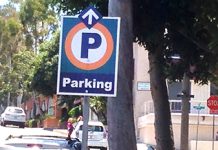Mike Spindle described the magnetism of 49-year-old Laguna Beach resident Kelly Perkins, a 15-year heart transplant survivor.
“She makes you appreciate life and appreciate every breath that you take. Here’s this little tiny woman, and she travels around the world climbing mountains.”
Perkins’ 1992 diagnosis of viral cardiomyopathy led to congestive heart failure and, ultimately, a heart transplant in 1995. She said there were 40,000 people on the waiting list for organs then. That scared her, so she turned her passion for climbing into a cause: convincing more people to be organ donors, and in 2009 launched Moving Hearts Foundation (www.movinghearts.org) to “move hearts,” both literally and figuratively.
“For me, exercise is not an occasion but a lifestyle,” said Perkins, who compensates for her compromised cardiac output with a rigorous exercise routine, which helps optimize her blood pressure, circulation and energy level. She must also take immunosuppressive medications every day for the rest of her life so her body does not reject her heart. And the heart is the key.
“I think people are inspired by my heart and what it has been able to do,” said Perkins. “I am simply the joyful capsule that now gets to go along for the ride.”
In all, she has done 10 major climbs around the globe with her “borrowed” heart as she calls it, and each one has symbolic meaning. In 2008 she chose Half Dome in Yosemite, “because if you look at Half Dome, what makes it such a standout is not that it’s perfect, but that it’s broken. And while it may be broken it still stands tall, evoking a message building spirit that I felt would convey a powerful point by climbing it as a transplant recipient.”
Upon reaching the summit, by the Northwest Face, a 2,000-foot high technical rock climb, not the standard hike up the easy side, she was welcomed by over 125 red-shirted people, standing in the formation of a heart.
Perkins describes her journey from the transplant waiting list to cresting peaks in her book, “The Climb of My Life: Scaling Mountains with a Borrowed Heart” (Rowman & Littlefield, Nov. 2007). She found that the visibility of her climbs is a great way to broadcast her message.
“People gravitate towards the climbing images as it personifies the beauty of life and living,” she said.
Spindle and his partner Paola Porrini-Bisson, realtors who sold the Perkins their Laguna home last June, were so inspired by Perkins that they recently organized a gathering for her and 80 guests at the home of a friend in Newport Beach.
“She asked everyone to try and elevate their lives in any way they can,” regardless of whether or not they were organ donors or recipients, said Roger Kempler of Laguna Beach, who attended the Nov. 7 gathering.
Describing Perkins talk, Joy Dittberner, a friend, said that she “reminds us that life is a very precious gift, not to be wasted.” She added that Perkins’ other message “is the need for us all to be organ donors.”
Dittberner spoke from experience. Her husband is a 20-year survivor of a kidney transplant.
Perkins’ husband Craig said that sharing their experience with others facing similar challenges has been particularly rewarding.
“I would have liked to have known a success story like ours prior to all the chaos, as hope is a treasured commodity for those addressing a serious illness,” he said.
Avid mountain climbers before the operation, the Perkins were determined to not to let the transplant curtail their forays at altitude. Just two years after her procedure, they climbed Mt. Whitney, at 14,505 feet, the highest mountain in the continental US, making Perkins the only person to have hiked it with two different hearts. The following July, Perkins tackled Mount Fuji, Japan’s highest peak at 12,388 feet, to celebrate a new law that would legalize heart transplants in that country. The emotion of the experience became overwhelming when she accepted the unexpected honor of dispersing the ashes of her heart’s donor at the summit. After being approached about the mission by the donor’s family, Craig carried the ashes but remained mute about his special cargo, not wanting to add pressure to his wife’s attempt at the imposing peak. Standing on top was an accomplishment. Being able to share it, in a way, with the person who gave her the heart that made it possible was indescribable.
In August 2003 the couple summitted Switzerland’s Matterhorn, which is higher than Mt. Whitney. Just prior to Perkins’ diagnosis, they hiked in the valley below the renowned peak, gazing up in awe, and wondered even then if they were up to it. Successfully climbing the peak ten years later, after her transplant, “was a powerful full circle moment,” said Perkins.
According to the U.S. Department of Health and Human Services, 1,569 heart transplants were performed to date in 2010. As of Nov. 19, there were 3,259 people on the waiting list for a heart.
Perkins urges those who became organ donors with the DMV before 2006 to register on line since there was no official list back then. Online registry is more effective than a donor card, which is not always available at the time of death. According to Perkins’ web site, www.theclimbofmylife.com, 7.5 million people in California are registered donors, which is 20 percent participation. She believes Californians can do better. For Perkins, when she discovered she needed a heart, it made a difference that she was a registered donor.
“My position is that if you win the lotto, you should buy a ticket!” she said.




